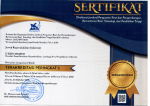CAREER MEANING FOR INDONESIAN WOMEN: A CASE STUDY OF WOMEN EMPLOYEES IN A FOOD PROCESSING INDUSTRY
Abstract
Berkarir bukanlah merupakan hal baru dan tidak dilarang bagi perempuan Indonesia. Namun demikian, apa yang dimaksudkan dengan karir, temyata sangat beragam dan tidak terbatas hanya pada lingkup kerja dalam dimensi ruang publik. Tulisan ini menggambarkan makna karir bagi dua puluh perempuan pekerja dari berbagai posisi pekerjaan di suatu perusahaan industri pengolah makanan. Makna dan citra perempuan karir terbentuk dan terintemalisasikan berdasarkan pengalaman sejak kecil baik atas pengamatan di dalam kehidupan rumah tangga orangtuanya maupun lingkungan sekitar. Perempuan karir tidak hanya perempuan yang bekerja di sektor publik, tapijuga perempuan yang tinggal di rumah yang bekerja sebagai ibu rumah tangga mengurus anak dan suaminya. Perempuan karir yang dianggap sukses adalah perempuan yang tidak hanya sukses dalam kerja di ruang publik yang dicirikan dengan pencapaian posisi kerja atau jabatan yang tinggi, tetapi dia juga harus sukses dalam membina rumah tangga.
Kata Kunci: Makna karir, karir perempuan, pekerja perempuan
Keywords
Full Text:
PDFReferences
Adamson, S. J., Doherty, N., & Viney, C. (1998). The meanings of career revisited: Implications for theory and practice. British Journal of Management, 9(4), 251-259. crossref
Adler, N. J. (1993). Asian women in management. International Studies of Management & Organization, 23(4), 3-17. crossref
Aziz, I. 1996. Pengembangan Karier Pegawai Negeri Sipil Perempuan di Setwilda Tingkat I Sulawesi Tengah. Unpublished Master Thesis, Universitas Indonesia, Jakarta.
Bhatnagar, D., & Rajadhyaksha, U. (2001). Attitudes towards work and family roles and their implications for career growth of women: A report from India. Sex Roles, 45(7), 549-565. crossref
Bianpoen, C. (2000). The Family Welfare Movement: A Blessing or a Burden? In C. Bianpoen (Ed.), Indonesian Women: The Journey Continues. Canberra: The Australian National University-Research School of Pacific and Asian Studies.
Blau, F. D., & Ferber, M. A. (1992). The Economics of Women, Men, and Work (2nd edition). New Jersey: Prentice-Hall.
Brett, J. M. (1997). Family, Sex, and Career Advancement. In J. H. Greenhause (Ed.), Integrating Work and Family: Challenges and Choices for a Changing World. Westport, Connecticut London: Quorum Books.
Budiati, S. P. (1997). Wanita di Sektor Publik Yang Maskulin: Makna Keberhasilan Karir dan Jabatan Bagi Wanita Sebagai Rimbawan di Perum Perhutani. Universitas Airlangga, Surabaya.
Coupland, C. (2004). Career definition and denial: A discourse analysis of graduate trainees’ accounts of career. Journal of Vocational Behavior, 64(3), 515-532. crossref
Edwards, J. R., & Rothbard, N. P. (1999). Work and family stress and well-being: An examination of person-environment fit in the work and family domains. Organizational Behavior and Human Decision Processes, 77(2), 85-129. crossref
Gan, J. C. Y., Samaratunge, R., & Smith, W. (2000), 22-24 February. Work-Family Conflict and Women Managers: Empirical Evidence from Malaysia. Paper presented at the International Symposium on Malaysian Business in the New Era, Kuala Lumpur, Malaysia.
Greenhaus, J. H., Collins, K. M., & Shaw, J. D. (2003). The relation between work–family balance and quality of life. Journal of Vocational Behavior, 63(3), 510-531. crossref
Hall, D. T. (1976). Careers in Organizations. Santa Monica, California: Goodyear.
Kennelly, I. (2002). “I would never be a secretaryâ€: Reinforcing gender in segregated and integrated occupations. Gender & Society, 16(5), 603-624. crossref
Komarraju, M. (1997). The Work-Family Interface in India. In J. H. Greenhause (Ed.), Integrating Work and Family: Challenges and Choices for a Changing World. Westport, Connecticut London: Quorum Books.
Kompas. (1999), 5 April. Muslimah Tolak Konsep Peran Ganda Kompas daily newspaper.
Lo, S., Stone, R., & Ng, C. W. (2003). Work-family conflict and coping strategies adopted by female married professionals in Hong Kong. Women in Management Review, 18(4), 182-190. crossref
Nieva, V. F., & Gutek, B. A. (1981). Women and Work: A Psychological Perspective. New York: Praeger Publishers.
O’Connor, V. J. (2001). Women and men in senior management – a “different needs†hypothesis. Women in Management Review, 16(8), 400-404. crossref
Ong, A. (1995). State versus Islam: Malay Families, Women's Bodies, and the Body Politic in Malaysia. In M. G. Peletz. (Ed.), Bewitching Women, Pious Men: Gender and Body Politics in Southeast Asia. Berkeley: University of California Press.
Parasuraman, S., & Greenhause, J. H. (1997). Integrating Work and Family: Challenges and Choices for a Changing World. Westport, Connecticut London: Quorum Books.
Rotter, J. C., & Evans, K. M. (2002). The influence of family, career, and culture on individuals. In Evans, Kathy M & Rotter, Joseph C (Ed). 2002. Synthesizing Family, Career, and Culture: A Model for Counseling in the Twenty-first Century (pp. 3-15). Alexandria, VA: American Counseling Association.
DOI: https://doi.org/10.14203/jki.v5i1.97
Copyright (c) 2016 Jurnal Kependudukan Indonesia

This work is licensed under a Creative Commons Attribution-NonCommercial-ShareAlike 4.0 International License.
-----------------------------------------------------------------------------------------------------------------------------
Research Center for Population, Indonesian Institute of Sciences
Widya Graha Building, 7th and 10th floors
Jl. Jenderal Gatot Subroto 10 Jakarta Selatan, Telp (021) 5221687
Website: http:/kependudukan.lipi.go.id;
E-Journal: http://ejurnal.kependudukan.lipi.go.id
Pustaka: http://pustaka.kependudukan.lipi.go.id
-----------------------------------------------------------------------------------------------------------------------------








